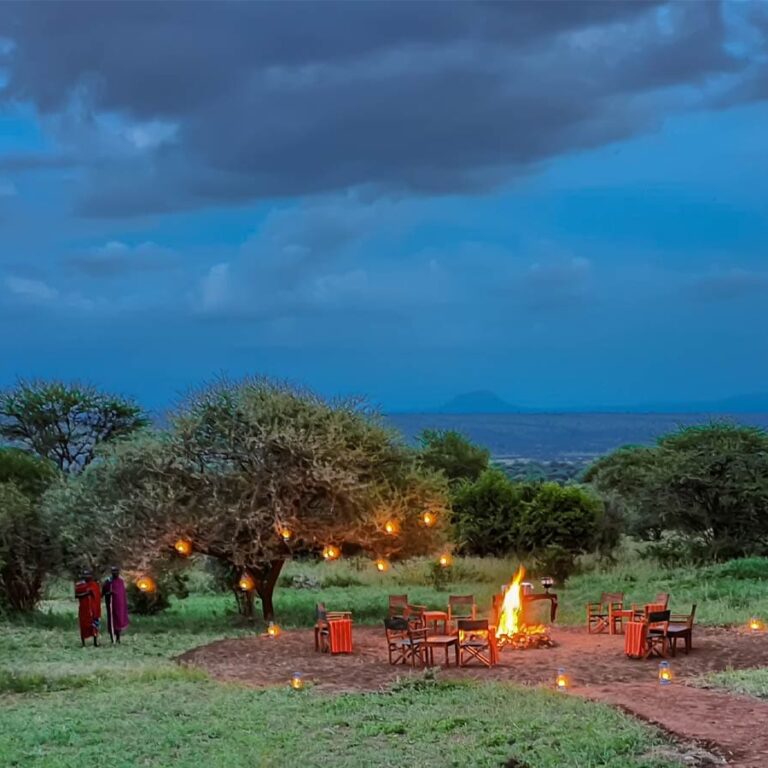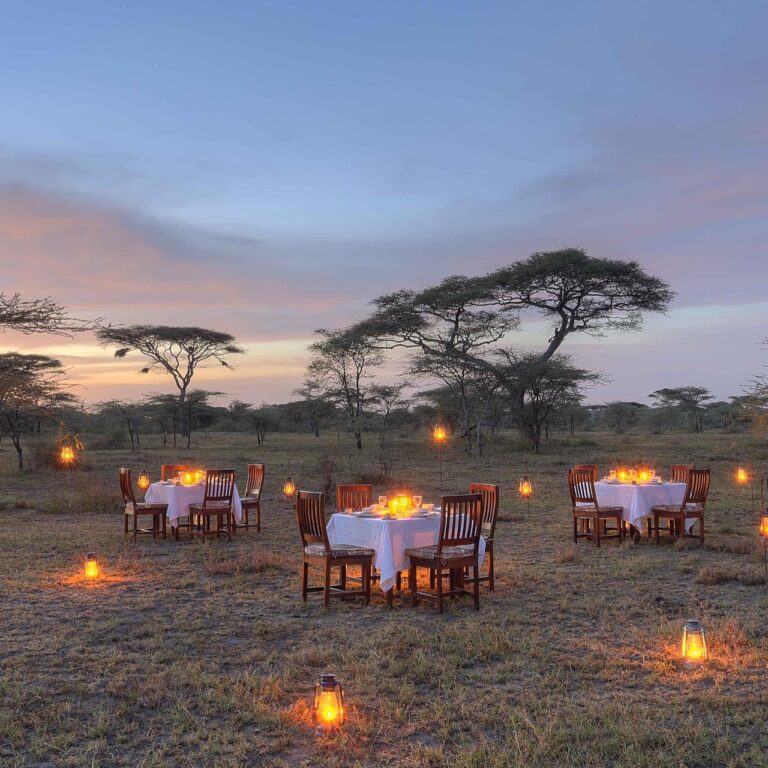Embarking on an African safari is an unforgettable, thrilling adventure that promises breathtaking landscapes, diverse wildlife, rich cultural experiences, and rich cultural experiences. But preparation is key. First, pack light, breathable clothing in neutral colors to blend with the landscape and avoid attracting insects. Don’t forget sturdy walking shoes and a warm layer for chilly mornings.
Always carry binoculars for wildlife spotting and a camera with extra batteries and memory cards. Stay hydrated by drinking plenty of water, and keep snacks handy for energy during long drives. Respect wildlife by maintaining a safe distance and following your guide’s instructions. Finally, check health requirements like vaccinations and obtain proper insurance to cover unexpected events. With these tips, you’ll be ready for an incredible adventure in the wild!
However, to make the most of your safari, preparation is key. Here are essential travel tips to ensure a seamless and enjoyable safari experience. To ensure a memorable and comfortable African safari, pack light, bring a first-aid kit and medication, choose Foot Slopes Tours and Safaris, an African local Safari tour operator, dress down, and be flexible with your itinerary, while also considering travel insurance and vaccinations. To ensure you make the most of your journey, consider these essential travel tips.
Choose the Right Time to Go on an African Safari
Timing can significantly influence your safari experience. The best times to visit most safari destinations in Africa are during the dry seasons, typically from May to October. During this period, wildlife congregates around water sources, making animal sightings more frequent. Conversely, the wet season, from November to April, offers lush landscapes and abundant flora but can make some areas less accessible due to rain. Check this When. Is the best time to go on an African safari
Dry Season (June to October): This is the peak season for safaris in East and Southern Africa. ✔Wildlife Viewing: Animals are forced to cluster around shrinking waterholes, which makes spotting them easier. ✔Weather: The weather is generally cooler and drier, with lower chances of rain. ✔Popular Destinations: East Africa (Serengeti, Tarangire, Lake Manyara, Arusha National Park, Ngorongoro Crater, Lake Eyasi, Lake Natron, Mount Kilimanjaro National Park, and Zanzibar beach are popular during this time.
Wet Season (November to April): While the wet season brings lush greenery and abundant wildlife, it can also be a challenge for game viewing due to the dispersed animals and potential for rain. ✔Pros: You’ll see fewer tourists and may find better deals. ✔Cons: Some more remote accommodations might close, and the landscape can be muddy. ✔Specific Events: The Great Migration in Tanzania is a highlight during the wet season, especially in January and February.
Shoulder Seasons (May and November): These months offer a balance between the crowds of peak season and the potential for rain of the wet season. ✔Wildlife: You’ll still see good wildlife viewing, and the landscape is transitioning between green and dry. ✔Weather: The weather can be unpredictable, with some rain possible.
Pack Smart
Packing appropriately can enhance your safari experience dramatically. Lightweight, breathable clothing in neutral colors is optimal, as it keeps you cool and helps you blend in with the surroundings. Don’t forget essentials such as a wide-brim hat, sunglasses, and a light rain jacket. Sturdy walking shoes are crucial if you plan on taking nature walks. Additionally, include a small backpack for day trips and essentials like sunscreen, insect repellent, and a refillable water bottle. Don’t Pack: Camouflage clothing, single-use plastic bags (in some regions), and drones (at most camps). Check this: What to pack for an African safari.
Get Vaccinated
Health precautions are crucial before traveling to Africa. Before your trip, consult with a healthcare provider about vaccinations and medications recommended for the regions you will be visiting. Common vaccinations include those for yellow fever, hepatitis A, and typhoid, among others. Although some vaccinations are required by law, it’s always wise to take precautions against possible illnesses like malaria, and travel tips when going on an African Safari. Malaria is prevalent in many safari regions, so anti-malarial medication is recommended. Carry a basic first-aid kit with pain relievers, antihistamines, rehydration salts, and any personal prescriptions.
Respect Wildlife
Wildlife encounters are central to any safari, yet it’s vital to approach them with respect and caution. Maintain a safe distance from animals and never attempt to feed or provoke them. Follow your guide’s instructions and stay within the designated areas to ensure both your safety and that of the wildlife. Avoid making loud noises or sudden movements that might startle the animals. Remember, you are in their habitat—be a respectful guest. For a family-friendly African safari experience, prioritize lodges with excellent animal sightings, comfortable accommodations, and attentive staff, particularly in Serengeti National Park, Ngorongoro Crater.
Bring a Good Camera
A safari presents countless photographic opportunities, making a good camera essential. Bring a DSLR or a high-quality point-and-shoot camera to capture vibrant landscapes and amazing wildlife moments. Don’t forget additional batteries, memory cards, and a lightweight tripod if you’re keen on capturing the perfect shot during golden hour.
A safari is a once-in-a-lifetime experience, and capturing the moments is essential. A good camera with a zoom lens will help you take stunning wildlife shots. If using a smartphone, consider bringing a telephoto lens attachment. Extra batteries and memory cards are necessary, as you might not always have access to charging facilities. A dustproof bag can help protect your equipment from the elements.
Stay Hydrated
The African sun can be intense, especially during the dry season. Always carry water with you to stay hydrated throughout your adventures. Many lodges provide refillable water stations, so bring a reusable water bottle to reduce plastic waste, and travel tips when going on an African Safari. Safaris can be physically demanding, with long game drives under the African sun. Avoid drinking tap water in remote areas to prevent stomach issues. Check this: What to know before going on an African safari?
Learn About the Culture
Africa is rich in diverse cultures and traditions. Take time to learn about the local communities and their customs. Engage with locals, ask questions, and show respect for their way of life. Learning a few basic phrases in Swahili or the local language can go a long way in fostering meaningful interactions. Understanding local customs and traditions enriches your safari experience. Spend some time researching the cultures of the regions you’ll visit. Avoid behaviors that could be considered disrespectful, such as taking photos of locals without permission. Participating in cultural tours or visiting local markets can offer insights into the lives of the people who call Africa home.
Choose an Eco-Friendly Lodge
Consider the environmental impact of your accommodation. Opt for eco-friendly lodges that practice sustainability through renewable energy, water conservation, and community involvement, and travel tips when going on an African Safari. Many lodges also support local wildlife conservation efforts, providing economic benefits to the communities and ecosystems you enjoy. Look for the Best African safari resorts for family accommodations that use solar power, limit plastic waste, and invest in local communities. Staying at such lodges ensures that your visit positively impacts the environment and local people.
To plan the perfect family safari, choose a malaria-free region like East Africa for young children, book private vehicles and family-friendly accommodations, and involve your children in planning their ideal activities. Pack a detailed first-aid kit, use binoculars, bring snacks and entertainment, and arrange early mealtimes. Hire experienced safari experts who specialize in family travel to ensure the trip is engaging and safe for everyone.
Tipping
Tipping is customary for guides and lodge staff in Africa. It is advisable to carry small bills for this purpose. A tip of 10-15% of your total bill at restaurants or lodges is typically appreciated, and guides usually appreciate around $10-15 per day, depending on the service provided. Research the tipping norms for your destination and bring small denominations of local currency or U.S. dollars.
Cash, Credit Cards & ATMs
When planning an African safari, consider carrying a mix of cash and cards. While major tourist areas accept credit cards, remote regions may require cash for tips and local purchases. Ensure your cash is in small denominations, as change can be limited. ATMs are available in cities, but it’s wise to withdraw enough cash before venturing into remote areas. Always inform your bank of your travel plans to avoid card blocks. Safety first—secure your cash in a money belt. While many lodges accept credit cards, it’s good practice to carry cash, especially for purchases in smaller towns or markets. Ensure you have local currency on hand, as ATMs may not be readily available in remote areas.
Dust
African safaris can be dusty, especially in dry regions. The dry, dusty conditions of many safari regions can be challenging. Protect yourself and your belongings by wearing a scarf or a buff over your nose and mouth. Pack zip-lock bags to keep electronics and important documents dust-free. If you wear contact lenses, consider switching to glasses to avoid eye irritation.
Mobile (Cell) Phone & Internet Access
Consider your connectivity needs while on safari. Many lodges offer Wi-Fi, but the signal may be weak, especially in remote areas. Travel tips when going on an African Safari: Inform your family and friends about your travel plans, and consider purchasing a local SIM card if you require a mobile signal. If staying connected is essential, consider getting a local SIM card with a data plan upon arrival. Be prepared for periods without service and embrace the opportunity to disconnect and immerse yourself in nature.
Electric Current
Different countries in Africa use various plug types and voltages, and travel tips when going on an African Safari. Research your destination’s electrical standards and carry the appropriate travel adapter. Many safari lodges run on solar power or generators, which may have limited charging hours, so bringing a power bank is recommended. Check the voltage and plug type used in the countries you’ll be visiting. Most African nations use a plug type C or D, with a voltage of 220- 240V. A universal travel adapter can be invaluable to keep all your devices charged.
Africa Visa & Entry Requirements
Embarking on an African safari is a thrilling adventure, but it requires some preparation. First, ensure your passport is valid for at least six months beyond your stay and has blank pages for entry stamps. Visa requirements vary by country; many visitors can obtain a visa on arrival, while others may need to apply in advance.
It’s vital to research the specific requirements for the countries you plan to visit, as some may require proof of onward travel or vaccinations, such as for yellow fever travel tips when going on an African Safari. A visa is required, and this can be obtained in advance or on arrival. The current visa cost is US$50 per person (for UK passports) or US$100 per person (for US passports), payable in USD. Pack light, breathable clothing, sturdy footwear, binoculars, and a good camera to capture the stunning wildlife. Lastly, remember to stay hydrated and follow your guide’s safety advice to enjoy this unforgettable experience fully.
Travel Insurance
Lastly, never underestimate the importance of robust travel insurance. Ensure your policy covers medical emergencies, trip cancellations, and wildlife-related incidents, as well as personal belongings. Book with the best bucket list, most luxurious African safari tour companies.
With these tips in mind, you’re best luxury African safari tours & tailor-made packages are ready to embark on a remarkable African safari. Prepare well, stay respectful, and immerse yourself in the enchanting landscapes and wildlife that await tips when going on an African Safari. Your adventure will be as unforgettable as the memories you create.
Comprehensive travel insurance is a must for any safari trip. Ensure your policy covers medical emergencies, evacuation, trip cancellations, and lost belongings. Safari activities, such as walking safaris or hot air balloon rides, may require additional coverage, so verify the specifics with your insurer before departure, for the first time African safari planning. Want to go on an African Safari? Click on the button below to compare African safaris offered by top-rated tour operators.
Choose the Right African Safari Destinations
To choose the right East Africa safari destinations, consider what wildlife you want to see, as Serengeti is famous for the Great Migration, while Ngorongoro Crater offers the Big 5, and Tarangire has abundant elephants. Also, factor in the time of year, as dry seasons (June-October) have better game viewing but more crowds, while wet seasons offer lush scenery and baby animals with fewer visitors. Finally, consider if you want to combine the northern circuit with the less-crowded southern parks like Ruaha or the western parks for chimpanzees in Mahale.
The top destinations to visit on luxury African safari tours include the iconic Serengeti National Park for the Great Migration, the Ngorongoro Crater for dense Big Five populations, Tarangire National Park for elephants, and the beautiful Zanzibar islands for relaxation. Other excellent luxury destinations are Ruaha National Park hidden gem African safari destination for luxury travelers for an off-the-beaten-path experience, and Nyerere National Park (formerly Selous) for river safaris and wild dog sightings.
How do I prepare for an African safari?
Lightweight, neutral-colored clothing
Hats, scarves, and sunglasses for sun protection
Comfortable walking shoes for bush walks
Binoculars for spotting wildlife from a distance
Sunscreen and insect repellent
Medications and a small first-aid kit
Insights on what to expect on Safari
A safari is an exhilarating adventure filled with breathtaking landscapes, close wildlife encounters, and rich cultural experiences. Expect early morning game drives, stunning sunsets, and diverse ecosystems teeming with animals like lions, elephants, and giraffes. Safari lodges range from luxury to eco-friendly camps, offering comfort amid nature. The affordable luxury African Safari Vacation Packages journey includes bumpy roads, occasional dust, and limited connectivity, but the reward is unparalleled scenery and unforgettable memories. Embrace the wild, respect nature, and enjoy an extraordinary experience!
How much should I tip an African safari guide?
How much to tip? Safari guide and staff. As a guideline, we suggest tipping the following amounts: Your safari guide: between US$5 and US$15 per group per day (depending on group size). You should tip an African safari guide between $10 and $20 per person, per day, with a higher amount reserved for private guides or exceptional service. For example, on a 7-day safari, a couple could tip around $140 to $280 for their guide. You can tip daily or at the end of the trip, and always consider the guide’s knowledge, safety, and overall enhancement of your experience.
Things You Should Know Before Going On Your First African Safari
Before heading out on your first African safari, research the best time to visit based on wildlife activity and weather. Pack neutral-colored clothing, sunscreen, and insect repellent. Don’t forget binoculars and a camera with extra batteries. Always listen to your guide—safety is key around wild animals. Respect nature: keep noise low and never feed the animals. Vaccinations and travel insurance are highly recommended. Expect early mornings, bumpy rides, and breathtaking views. Safaris can be dusty and rustic, but the experience is unforgettable. Embrace the adventure and be patient—wildlife sightings aren’t guaranteed, but are always worth the wait.
Ultimate guide to choosing your perfect safari destination
The Ultimate Guide to Choosing Your Perfect Safari Destination helps you find the ideal spot for your dream African adventure. Whether you’re after the Big Five, breathtaking landscapes, or unique cultural experiences, this guide breaks down top safari locations by wildlife, travel seasons, budget, and travel style. From Serengeti, Tarangire, Lake Manyara, Arusha National Park, Ngorongoro Crater, Mount Kilimanjaro, and Zanzibar beach, it offers expert insights to match your interests and expectations. Make the most of your safari by choosing a destination that perfectly fits your vision of the wild.
What to Expect: A Typical Day on Safari in Africa
What to Expect: A Typical Day on Safari in Africa offers a glimpse into the rhythm of life in the wild. From early morning game drives and breathtaking wildlife sightings to relaxing midday breaks and magical sunset safaris, this guide walks you through each moment. Discover the balance of adventure and tranquility, delicious meals in the bush, and evenings under star-filled skies. Whether you’re in a luxury lodge or a tented camp, learn what makes a safari day both thrilling and unforgettable.
The Ultimate Guide to Planning a Successful First African Safari
The Ultimate Guide to Planning a Successful First African Safari is your comprehensive companion for an unforgettable adventure. Tailored for first-time travelers, this guide walks you through everything—from selecting the perfect safari destination and timing your trip right to understanding what to pack and how to stay safe. With expert tips on spotting wildlife, choosing lodges, and respecting local cultures, you’ll be fully prepared to enjoy the magic of Africa’s wilderness. Start your safari journey with confidence and make memories that last a lifetime.
A Beginner’s Guide to Planning Your First African Safari
A Beginner’s Guide to Planning Your First African Safari is the perfect starting point for anyone dreaming of an authentic wildlife adventure. This easy-to-follow guide covers everything you need to know—from picking the right destination and safari type to travel tips, packing advice, and safety essentials. Whether you’re drawn to the Big Five or stunning landscapes, this guide helps you plan a smooth and memorable journey into the heart of Africa. Get ready to explore the wild with confidence and excitement!
Everything You Need To Know To Plan An Amazing African Safari
To plan an amazing African safari, you must choose your destination based on desired wildlife, select the best time of year to visit for optimal viewing, decide between booking with a specialist agent or independently, and prioritize game drive time when booking your accommodations. Essential health preparations include getting necessary vaccinations and malaria pills as advised by your doctor. Remember to pack layers, sunglasses, a hat, and binoculars for the trip, and to always stay aware of your surroundings. An extensive guide on how to make the most of your African Safari, including where to go, what to bring, and money-saving tips.
Final Thought
An African safari is an extraordinary journey, but proper preparation is essential for a smooth and enjoyable experience. By choosing the right time to go, packing wisely, respecting wildlife, and staying informed about local customs and logistics, you can make the most of your adventure while ensuring a responsible and rewarding Africa High End Luxury Safaris
trip. With these travel tips in mind, get ready to embark on the safari of a lifetime!








